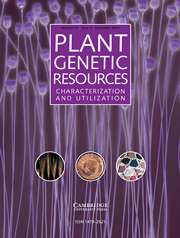Crossref Citations
This article has been cited by the following publications. This list is generated based on data provided by Crossref.
Alejos-Gonzalez, Fatima
Perkins, Kelly
Winston, Malcolm Isaiah
and
Xie, De-Yu
2013.
Efficient Somatic Embryogenesis and Organogenesis of Self-Pollination <i>Artemisia annua</i> Progeny and Artemisinin Formation in Regenerated Plants.
American Journal of Plant Sciences,
Vol. 04,
Issue. 11,
p.
2206.
Wang, Hongzhen
Han, Junli
Kanagarajan, Selvaraju
Lundgren, Anneli
Brodelius, Peter E.
and
Schönbach, Christian
2013.
Studies on the Expression of Sesquiterpene Synthases Using Promoter-β-Glucuronidase Fusions in Transgenic Artemisia annua L.
PLoS ONE,
Vol. 8,
Issue. 11,
p.
e80643.
Paul, Shilpi
Khanuja, Suman P.S.
and
Gupta, Madan M.
2014.
Breeding strategy for genetic improvement up to four generations in relation to artemisinin with canopy and other secondary metabolites in Artemisia annua L.
Industrial Crops and Products,
Vol. 56,
Issue. ,
p.
67.
Muangphrom, Paskorn
Suzuki, Munenori
Seki, Hikaru
Fukushima, Ery Odette
and
Muranaka, Toshiya
2014.
Functional analysis of orthologous artemisinic aldehyde Δ11(13)-reductase reveals potential artemisinin-producing activity in non-artemisinin-producing <i>Artemisia absinthium</i>.
Plant Biotechnology,
Vol. 31,
Issue. 5,
p.
483.
Wang, Hongzhen
Kanagarajan, Selvaraju
Han, Junli
Hao, Mengshu
Yang, Yiyi
Lundgren, Anneli
and
Brodelius, Peter E.
2014.
Studies on the expression of linalool synthase using a promoter-β-glucuronidase fusion in transgenic Artemisia annua.
Journal of Plant Physiology,
Vol. 171,
Issue. 2,
p.
85.
Ma, Dong-Ming
Wang, Zhilong
Wang, Liangjiang
Alejos-Gonzales, Fatima
Sun, Ming-An
and
Xie, De-Yu
2015.
A Genome-Wide Scenario of Terpene Pathways in Self-pollinated Artemisia annua.
Molecular Plant,
Vol. 8,
Issue. 11,
p.
1580.
Muangphrom, Paskorn
Seki, Hikaru
Fukushima, Ery Odette
and
Muranaka, Toshiya
2016.
Artemisinin-based antimalarial research: application of biotechnology to the production of artemisinin, its mode of action, and the mechanism of resistance of Plasmodium parasites.
Journal of Natural Medicines,
Vol. 70,
Issue. 3,
p.
318.
Xie, De-Yu
Ma, Dong-Ming
Judd, Rika
and
Jones, Ashley Loray
2016.
Artemisinin biosynthesis in Artemisia annua and metabolic engineering: questions, challenges, and perspectives.
Phytochemistry Reviews,
Vol. 15,
Issue. 6,
p.
1093.
Ikram, Nur K. B. K.
and
Simonsen, Henrik T.
2017.
A Review of Biotechnological Artemisinin Production in Plants.
Frontiers in Plant Science,
Vol. 8,
Issue. ,
Namuli, Aidah
Bazira, Joel
Casim, Tolo Umba
Engeu, Patrick Ogwang
and
Llorens, Eugenio
2018.
A review of various efforts to increase artemisinin and other antimalarial compounds in Artemisia Annua L plant.
Cogent Biology,
Vol. 4,
Issue. 1,
p.
1513312.
2021.
Advanced Fermentation and Cell Technology.
p.
687.
Wani, Kaiser Iqbal
Choudhary, Sadaf
Zehra, Andleeb
Naeem, M.
Weathers, Pamela
and
Aftab, Tariq
2021.
Enhancing artemisinin content in and delivery from Artemisia annua: a review of alternative, classical, and transgenic approaches.
Planta,
Vol. 254,
Issue. 2,
Li, Yongpeng
Chen, Tiantian
Liu, Hang
Qin, Wei
Yan, Xin
Wu-Zhang, Kuanyu
Peng, Bowen
Zhang, Yaojie
Yao, Xinghao
Fu, Xueqing
Li, Ling
and
Tang, Kexuan
2022.
The truncated AaActin1 promoter is a candidate tool for metabolic engineering of artemisinin biosynthesis in Artemisia annua L..
Journal of Plant Physiology,
Vol. 274,
Issue. ,
p.
153712.
Xu, Jiang
Liao, Baosheng
Yuan, Ling
Shen, Xiaofeng
Liao, Xuejiao
Wang, Jigang
Hu, Haoyu
Huang, Zhihai
Xiang, Li
and
Chen, Shilin
2022.
50th anniversary of artemisinin: From the discovery to allele-aware genome assembly of Artemisia annua.
Molecular Plant,
Vol. 15,
Issue. 8,
p.
1243.
Luisi, Grazia
2023.
Terpenes.
p.
158.
Jadaun, Jyoti Singh
Yadav, Ritesh
Yadav, Nisha
Bansal, Shilpi
and
Sangwan, Neelam S.
2023.
Natural Secondary Metabolites.
p.
403.
Qamar, Firdaus
Ashrafi, Kudsiya
Singh, Anupam
Dash, Prasanta K.
and
Abdin, M.Z.
2024.
Artemisinin production strategies for industrial scale: Current progress and future directions.
Industrial Crops and Products,
Vol. 218,
Issue. ,
p.
118937.
Soni, Ranjana
Singh, Arpita
and
Gupta, Vikrant
2024.
Efficient
in vitro
regeneration of
Artemisia annua
: effect of different combinations of plant growth regulators on various types of explants
.
Plant Biosystems - An International Journal Dealing with all Aspects of Plant Biology,
Vol. 158,
Issue. 1,
p.
59.


